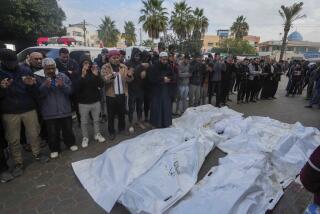Idea of peacekeeping force for Syria greeted coolly
- Share via
Reporting from Beirut — A request by Arab foreign ministers that a joint Arab-U.N. peacekeeping team be dispatched to Syria met little international enthusiasm Monday as the death toll mounted in the battleground city of Homs and elsewhere.
In Moscow, Russian Foreign Minister Sergei Lavrov told reporters that the continued violence in Syria rendered the idea of a peacekeeping mission somewhat premature, but that his nation was studying the Arab League proposal.
Such missions “need first to have a peace to support,” Lavrov told reporters at a news conference in the Russian capital.
The United States and other Western nations seeking the ouster of Syrian President Bashar Assad also said they were studying the Arab League plan.
The Arab League resolution, approved Sunday in Cairo, called for “an immediate and comprehensive end of all acts of violence and killing of Syrian civilians.”
The league, however, gave no prescription as to how to stop the killing in Syria, where a protest movement against the Assad government has evolved into an armed insurgency that has brought the nation to the brink of civil war.
Opposition activists reported at least 23 people killed Monday, including six in Homs, an anti-Assad stronghold, and nine in the northwestern province of Idlib, another hotly contested region where the government has lost control of territory.
The opposition says the Syrian military has now “completely sealed” many neighborhoods in Homs, where supplies of food, water and electricity were said to be low. The casualty figures could not be independently verified because media access to Syria is limited.
Russia’s stance on Syria is crucial because Moscow, joined by China, has twice vetoed U.N. Security Council resolutions condemning Assad’s crackdown. Security Council approval would be needed for a peacekeeping deployment in Syria.
Moscow has insisted that any cease-fire should involve a cessation of hostilities by both the government and the armed insurgents. But experts agree that a cease-fire seems a long way off, and violence could escalate.
Any peacekeeper proposal would have to overcome strong resistance from the government of Syria. The Assad administration denounced the Arab League action as a “hostile act” and “a call for foreign intervention in Syrian affairs.”
U.N. peacekeeping forces require the consent of the host nation.
With no diplomatic solution on the horizon, Arab and other nations calling for Assad to step down, including the United States and Turkey, have pledged additional aid to the Syrian opposition, which remains deeply divided. No foreign government has yet vowed to provide weapons to Syria’s armed resistance, though Syrian authorities say arms have been pouring in via Syria’s borders.
In New York, the U.N.’s High Commissioner for Human Rights, Navi Pillay, told the U.N. General Assembly that the organization’s failure to act had “emboldened” Assad to “pummel” Homs, shelling densely populated neighborhoods in “an indiscriminate attack on civilian areas.” She urged the United Nations to take action to protect the Syrian people.
The Assad government denies targeting civilians and says it is fighting “terrorists” and Islamic militants intent on waging a sectarian war.
More to Read
Sign up for Essential California
The most important California stories and recommendations in your inbox every morning.
You may occasionally receive promotional content from the Los Angeles Times.









